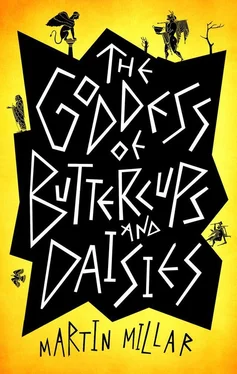Luxos and the girl wasted no time in fleeing the kitchen. Aristophanes pursued them into the hallway.
‘What’s the idea of forcing your way into this house?’
‘We’re the entertainment,’ said Luxos.
‘No you’re not! Depart immediately or people will think I invited you. They know we’re in the same tribe.’
With the kitchen now hostile territory, thanks to the imbecilic Luxos, Aristophanes was forced to return to the dining room, still without a goblet of wine. He cursed under his breath. He should have known to fortify himself before setting out.
General Lamachus and the statesman Nicias were reclining on adjacent couches. Nicias looked far older than the general, though the age difference could only have been seven or eight years. The general was a tough, grizzled man who led by example on the battlefield, and showed no sign of his powers diminishing with the passing years. Lamachus had his opponents, and Aristophanes didn’t like him, but no one could ever accuse him of hanging back when there was fighting to be done, or sending others to die in his place. He leaned over to speak to Nicias.
‘I hear you couldn’t get the Spartans back to the negotiating table.’
‘I couldn’t get anyone back to the negotiating table. The Athenians are acting just as badly as the Spartans.’
‘I wouldn’t say we were acting badly. We’re simply not ready for peace. What’s wrong with that?’
‘What is wrong is that it will destroy the city.’
‘Really? I’d say we’ve had the upper hand in the fighting recently.’
‘Recently?’ said Nicias. ‘Perhaps. But it wasn’t long ago that the war was going badly. Then we’d have been pleased with an honourable peace. But as soon as things improve a little, Athens starts thinking maybe we can win the war.’
Aristophanes nodded absently. What Nicias said was true. The phenomenon had been commented on widely enough. When the Athenians gained an advantage, they didn’t want peace. They wanted to press on with the war. Soon enough, the Spartans would gain the advantage. That made the Athenians think that peace might not be such a bad idea, but by then, the Spartans were no longer willing to negotiate. The cycle kept repeating, as it had for the past decade.
‘If we don’t make peace now, we’ll both be destroyed,’ said Nicias. Aristophanes didn’t hear the general’s reply, being diverted by the sight of Leucon and Eupolis sharing a couch. For rival playwrights, they made a show of getting along well. When the titles of the comedies in this year’s Dionysia had been announced — Peace by Aristophanes, The Flatterers by Eupolis, and The Clansmen by Leucon — his two competitors had made a great show of wishing each other luck. Aristophanes loathed all his rivals so comprehensively that he could hardly imagine wishing any of them luck. Callias bustled over and motioned for him to take the next empty couch.
‘I’m sure you three comedy writers have a lot to talk about! I’m hoping Euripides will be here soon, you know he’s presenting a tragedy this year.’
Euripides was a famous, if controversial, figure. Neither Eupolis nor Leucon seemed impressed by the prospect of his attendance.
‘I don’t set a lot of store by today’s tragedies,’ said Leucon.
‘Neither do I,’ agreed Eupolis. ‘The standard has gone down dreadfully in the past few years. I’ve always thought that comedy is much harder to do.’
‘I do agree! The common citizen doesn’t realise how hard it is to make people laugh.’
Aristophanes gritted his teeth. He was starting to think the wine was never going to arrive. He ignored the couch next to the playwrights and joined Socrates on his.
‘I hate these theatrical types.’
‘That must make your life awkward,’ said Socrates.
‘Has Callias got something against drinking?’
‘I don’t think so. Why?’
‘He hasn’t served any wine yet. I’d have thought you’d have noticed that, being such a famous intellectual. What’s the delay? The man owns his own vineyard, dammit.’
‘He’s probably just waiting for our garlands; look, here they are now.’
Four young men appeared in the room with garlands of flowers for each guest to wear. They were pleasant garlands, fresh and colourful. As the guests put them on their heads there was general appreciation shown towards their host. Callias beamed.
‘And now it’s time choose our symposiarch.’
The symposiarch acted as toastmaster for the evening, and decided how strongly the wine should be mixed.
‘I’ll do it,’ said Aristophanes, immediately.
Callias looked at him, and then round at the others.
‘Any other volunteers?’
‘I said I’ll do it!’ Aristophanes turned to the nearest servant. ‘Bring the wine and make it strong!’
The moon was obscured by clouds and the night-time streets were very dark. Even with her superior night-vision, Bremusa couldn’t see far in front of her. She wondered where Metris had got to.
Probably still hanging around with that moronic young poet. I never thought much of nymphs and this has confirmed my opinion. If the Goddess Athena sends you on an important mission and the first thing you do is become infatuated with a juvenile poet with too much hair and a poor work ethic, what does that say about your character? Not much. But nymphs are like that. No sense at all.
She halted, peering around her, trying to get her bearings. What was she doing here anyway?
I don’t know how to defeat Laet. If Athena had allowed me to kill her, I might have had a chance of succeeding. Now it’s hopeless. I have no clever plan. I’ve never had a clever plan.
The depression that had been gnawing at Bremusa since she arrived in Athens began to grow. She felt like a stupid, ancient, uneducated woman, a relic from the past, blundering around in a city she didn’t understand, surrounded by poets, artists and philosophers with whom she had nothing in common. Now she was meant to protect Aristophanes, another task she didn’t relish.
I loathe the theatre. I don’t understand why people want to sit and watch people pretending to be other people. What’s the point? I was born underneath a horse, on the way to battle. We didn’t have theatres.
The Amazon bumped into a statue of a naked man throwing a discus. She glared at it.
I don’t like their statues either. Or their paintings. The whole city is degenerate. I wouldn’t care if Sparta destroyed it.
She scowled. ‘Wait till I get my hands on Idomeneus. I’d have beaten him at Troy if my foot hadn’t slipped. I’ll make him sorry. And Metris too. What’s the matter with her? If my mother had caught me hanging round a young poet when I was her age, she’d have chopped my head off.’
Bremusa carried on, her mood worsening all the time.
Callias may be a fool, an easy target for flatterers and fortune hunters, who will probably divest him of his fortune one day. And he may be too keen to welcome inferior dramatists into his house. But I will give him credit for one thing. When he finally gets round to serving the wine, it’s good quality, and there’s an endless supply. Aristophanes was enjoying the role of symposiarch. The huge krater of wine in the centre of the room was emptying rapidly as each guest’s cup was filled again and again. Aristophanes called for the krater to be refilled, meanwhile ignoring all requests for the wine to be diluted, or handed round more slowly.
‘Stop complaining, you pathetic little weeds, and drink some wine. I’ve written better plays than all of you, I’ve fought better on the battlefield, and I’ve slept with more hetaerae than you. Now I’m going to show you how an Athenian can drink.’
Читать дальше












